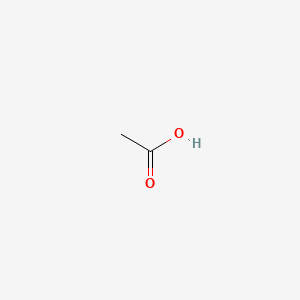
|
acetic acid |
acetic acid is a lipid of Fatty Acyls (FA) class. Acetic acid is associated with abnormalities such as Vitamin B 12 Deficiency. The involved functions are known as Excretory function. The related lipids are Propionate. |
89633 |
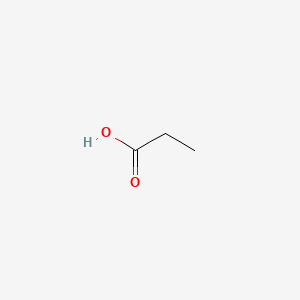
|
propionic acid |
propionic acid is a lipid of Fatty Acyls (FA) class. Propionic acid is associated with abnormalities such as Epilepsy, Infection, Tuberculosis, Alkalosis and Ischemia. The involved functions are known as Uptake, Biosynthetic Pathways, Methylation, Protein Overexpression and Biochemical Pathway. Propionic acid often locates in Body tissue, Cytoplasmic matrix, Membrane, Protoplasm and Extracellular. The associated genes with propionic acid are TRIO gene, TRRAP gene, SLC5A8 gene, SLC33A1 gene and Homologous Gene. The related lipids are Fatty Acids, Propionate, butyrate, Valerates and mycocerosic acid. |
7360 |
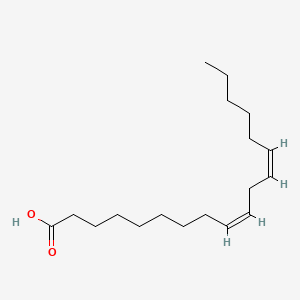
|
Linoleic acid |
Linoleic acid is a lipid of Fatty Acyls (FA) class. Linoleic acid is associated with abnormalities such as Diabetes Mellitus, Non-Insulin-Dependent, Metabolic syndrome, Obesity, Chronic Obstructive Airway Disease and Pneumonia. The involved functions are known as Insulin Resistance, Inflammation, Synthesis, Pathological accumulation of air in tissues and cytokine biosynthesis. The associated genes with Linoleic acid are TNF gene, CCL2 gene and TLR4 gene. The related lipids are palmitoleic acid, nervonic acid and Sphingolipids. |
5699 |
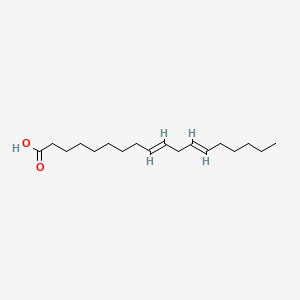
|
Linoelaidic acid |
Linoelaidic acid is a lipid of Fatty Acyls (FA) class. Linoelaidic acid is associated with abnormalities such as Obesity, Diabetes Mellitus, Non-Insulin-Dependent, Pneumonia, Chronic Obstructive Airway Disease and Metabolic syndrome. The involved functions are known as Metabolic Inhibition, Steroid biosynthesis, Signal Transduction, Insulin Resistance and Inflammation. Linoelaidic acid often locates in Mitochondria, Membrane and Cytoplasmic matrix. The associated genes with Linoelaidic acid are FFAR1 gene, C9orf7 gene, TNF gene, CCL2 gene and TLR4 gene. The related lipids are Fatty Acids, octadecadienoic acid, Steroids, methyl linoleate and Cyanoketone. |
10058 |
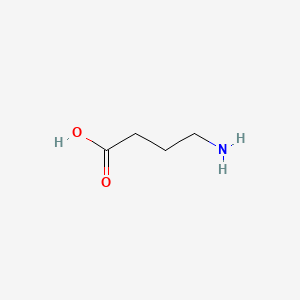
|
4-aminobutyric acid |
4-aminobutyric acid is a lipid of Fatty Acyls (FA) class. 4-aminobutyric acid is associated with abnormalities such as Epilepsy and Premenstrual syndrome. The involved functions are known as Binding (Molecular Function), neuron survival, Process, Uptake and physiological aspects. 4-aminobutyric acid often locates in Microglial, Neurofilament, Neuraxis, Brain region and Neurites. The associated genes with 4-aminobutyric acid are arginine methyl ester, SLC33A1 gene, NKS1 gene, P4HTM gene and ITSN2 gene. The related lipids are pregnenolone sulfate, pregnane-20-one, Pregnanes, Steroids and endogenous steroids. |
19702 |
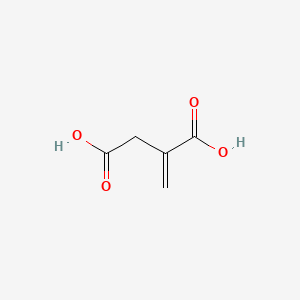
|
Itaconic acid |
Itaconic acid is a lipid of Fatty Acyls (FA) class. Itaconic acid is associated with abnormalities such as Tuberculosis and Bacterial Infections. The involved functions are known as Metabolic Inhibition, Gene Expression, Anabolism, Citric Acid Cycle and physiological aspects. Itaconic acid often locates in Protoplasm and Chromosomes, Human, Pair 13. The associated genes with Itaconic acid are Homologous Gene, IRG1 gene and Genome, Human. The related lipids are Propionate and Lipopolysaccharides. |
489 |
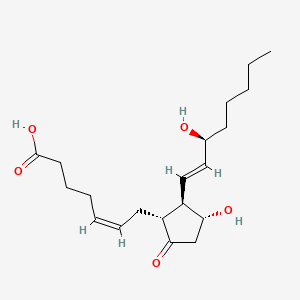
|
Prostaglandin E2 |
Prostaglandin E2 is a lipid of Fatty Acyls (FA) class. Prostaglandin e2 is associated with abnormalities such as Renal glomerular disease, Arthritis, Degenerative polyarthritis, Pancreatitis and Rheumatoid Arthritis. The involved functions are known as enzyme pathway, Atherogenesis, Anabolism, inhibitors and Oxidants. Prostaglandin e2 often locates in Tissue membrane, Blood, Extracellular, Membrane and Protoplasm. The associated genes with Prostaglandin E2 are PTGS2 gene, TP53 gene, TNFRSF5 gene, FASTK Gene and TNF gene. The related lipids are Lipopolysaccharides, Steroids, monooxyethylene trimethylolpropane tristearate, Fatty Acids, Unsaturated and Promega. The related experimental models are Arthritis, Adjuvant-Induced, Xenograft Model, Experimental Autoimmune Encephalomyelitis, Cancer Model and Knock-out. |
49278 |
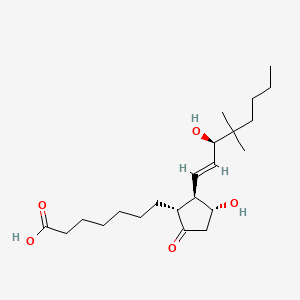
|
16,16-dimethyl-pge1 |
16,16-dimethyl-pge1 is a lipid of Fatty Acyls (FA) class. |
103 |
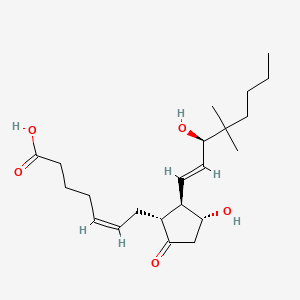
|
16,16-dimethyl-PGE2 |
16,16-dimethyl-pge2 is a lipid of Fatty Acyls (FA) class. |
785 |
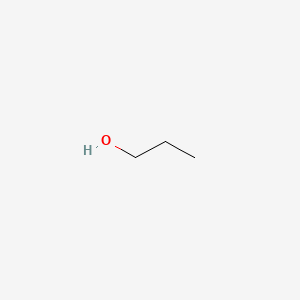
|
1-propanol |
1-propanol is a lipid of Fatty Acyls (FA) class. |
6697 |
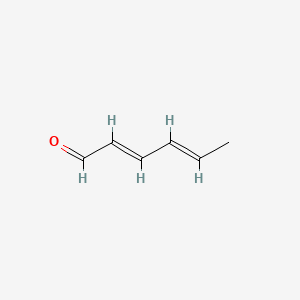
|
2,4-hexadienal |
2,4-hexadienal is a lipid of Fatty Acyls (FA) class. |
26 |
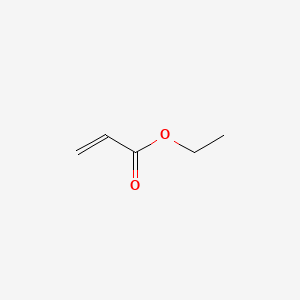
|
Ethyl acrylate |
Ethyl acrylate is a lipid of Fatty Acyls (FA) class. Ethyl acrylate is associated with abnormalities such as Renal glomerular disease. The involved functions are known as Force, Agent, Glomerular filtration and Cytolysis. Ethyl acrylate often locates in Head, Lipid Bilayers and Membrane. The associated genes with Ethyl acrylate are globular protein. |
132 |
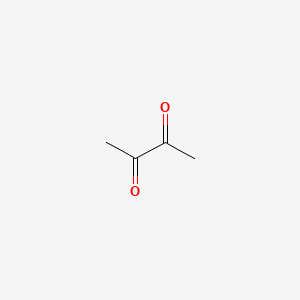
|
2,3-butanedione |
2,3-butanedione is a lipid of Fatty Acyls (FA) class. The involved functions are known as Physiologic Organization, Biochemical Pathway, physiological aspects, establishment and maintenance of localization and Phosphorylation. 2,3-butanedione often locates in Membrane, Microfilaments, Microtubules, Cell body of neuron and filamentous actin location. The associated genes with 2,3-butanedione are SLC33A1 gene and WASF1 gene. |
2715 |
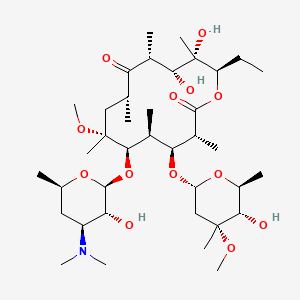
|
clarithromycin |
clarithromycin is a lipid of Polyketides (PK) class. Clarithromycin is associated with abnormalities such as Helicobacter Pylori Infection, Infection, Coinfection, Gastritis and Peptic Ulcer. The involved functions are known as Point Mutation, Increased Sensitivy, Bacterial resistance, urease activity and Mutation. Clarithromycin often locates in Blood, Gastric mucosa, Biopsy sample, Respiratory System and Entire gastrointestinal tract. The associated genes with clarithromycin are Genes, rRNA, rRNA Operon, Genome, HM13 gene and GDF15 gene. The related lipids are 9,11-linoleic acid, Steroids, Lysophosphatidylcholines, Lipopolysaccharides and 4-hydroxycholesterol. The related experimental models are Mouse Model, Knock-out and Experimental Pneumococcal Meningitis. |
10449 |

|
ZEARALENONE |
ZEARALENONE is a lipid of Polyketides (PK) class. Zearalenone is associated with abnormalities such as HYPOTRICHOSIS, LOCALIZED, AUTOSOMAL RECESSIVE, 2, Estrogen excess, Food-Drug Interactions, Osteomalacia and Osteoporosis. The involved functions are known as mRNA Expression, Metabolic Inhibition, Phosphorylation, Agent and Transcriptional Activation. Zearalenone often locates in Gastrointestinal tract structure, soluble, viral nucleocapsid location, Spindle and Hepatic. The associated genes with ZEARALENONE are Candidate Disease Gene, Genome, Genes, Reporter, P4HTM gene and Open Reading Frames. The related lipids are Lipopolysaccharides, Steroids, Fatty Acids and Promega. The related experimental models are Transgenic Model. |
2573 |
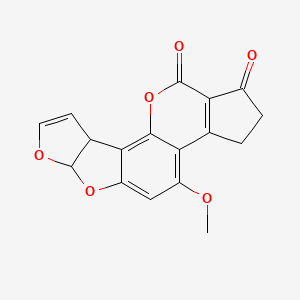
|
AFBI |
AFBI is a lipid of Polyketides (PK) class. Afbi is associated with abnormalities such as Pyotraumatic dermatitis, Infection, Hepatitis, Liver diseases and Hepatitis B. The involved functions are known as Immune response, Mutation, Anabolism, Metabolic Inhibition and Increased Sensitivy. Afbi often locates in Body tissue, Hepatic, Cytoplasm, Blood and Micronucleus. The associated genes with AFBI are TP53 gene, Genome, Transgenes, FATE1 gene and MANEA gene. The related lipids are Lipopolysaccharides, Lipid Peroxides, 1-(2-cyano-3,12-dioxooleana-1,9-dien-28-oyl) imidazole and Liposomes. |
5774 |
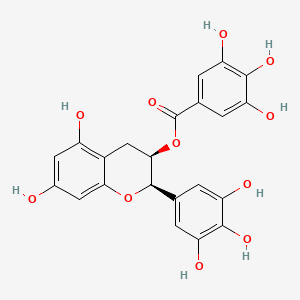
|
(-)-Epigallocatechin gallate |
(-)-Epigallocatechin gallate is a lipid of Polyketides (PK) class. (-)-epigallocatechin gallate is associated with abnormalities such as IMMUNE SUPPRESSION, Infection, Nodule, Lymphopenia and Tumor Immunity. The involved functions are known as Apoptosis, Cellular Immune Response, Specific immune response, Signal and Infiltration. (-)-epigallocatechin gallate often locates in Immune system, Cytoplasmic Granules, Skin, Protoplasm and Body tissue. The associated genes with (-)-Epigallocatechin gallate are C8orf4 gene, Genes, vpr, MAPK8 gene, P4HTM gene and GAG Gene. The related lipids are Promega, Lipopolysaccharides, Palmitates, Fatty Acids and Sphingolipids. The related experimental models are Mouse Model, Xenograft Model, Transgenic Model, Experimental Autoimmune Encephalomyelitis and Arthritis, Collagen-Induced. |
6551 |
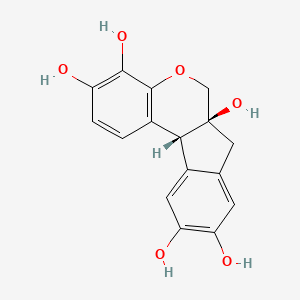
|
HEMATOXYLIN |
HEMATOXYLIN is a lipid of Polyketides (PK) class. Hematoxylin is associated with abnormalities such as Eosinophilia, Duodenal Adenoma, Senile Plaques, Morphologically altered structure and Cervical abscess. The involved functions are known as Uptake, Apoptosis, Amplification, Necrosis and Karyopyknosis. Hematoxylin often locates in Body tissue, Extracellular, Compact bone, Skin and Basement membrane. The associated genes with HEMATOXYLIN are GAPDH gene, Genome, Elastin, MERTK wt Allele and P4HTM gene. |
6127 |
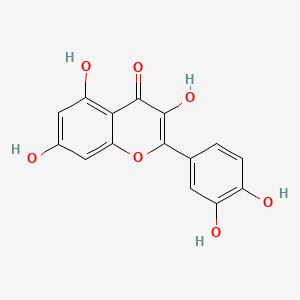
|
quercetin |
quercetin is a lipid of Polyketides (PK) class. Quercetin is associated with abnormalities such as Coronary heart disease, Myocardial Infarction, Cirrhosis, Coronary Arteriosclerosis and Vascular ring. The involved functions are known as Vasodilation, physiological aspects, Fermentation, Process and Ingredient. Quercetin often locates in Arterial system, Endothelium, Skin, Endothelium, Vascular and Tissue specimen. The associated genes with quercetin are P4HTM gene, SULT gene, UGT1A1 gene, ARHGAP26 gene and PLXNB1 gene. The related lipids are blood lipid, Promega, Steroids, Phosphatidylserines and Fatty Acids. The related experimental models are Knock-out, Mouse Model, Xenograft Model, Tissue Model and Cancer Model. |
5377 |
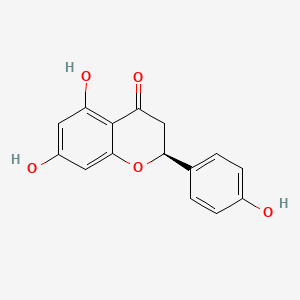
|
naringenin |
naringenin is a lipid of Polyketides (PK) class. Naringenin is associated with abnormalities such as Dehydration, Papillon-Lefevre Disease, BOSLEY-SALIH-ALORAINY SYNDROME, Cardiovascular Diseases and Atherosclerosis. The involved functions are known as Pigmentation, Biosynthetic Pathways, metaplastic cell transformation, 4-coumarate-CoA ligase activity and Pigment. Naringenin often locates in Body tissue, Cell Wall, Membrane, Cytoplasmic matrix and Tissue membrane. The associated genes with naringenin are Genome, Genes, Regulator, Alleles, Homologous Gene and SPEN gene. The related lipids are Fatty Acids, Total cholesterol, Lipopolysaccharides, Oleates and Cholesterol, Dietary. The related experimental models are Knock-out and Mouse Model. |
2420 |
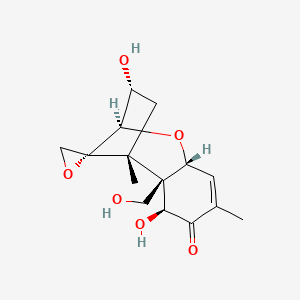
|
Vomitoxin |
Vomitoxin is a lipid of Prenol Lipids (PR) class. Vomitoxin is associated with abnormalities such as Infection and Gastroenteritis. The involved functions are known as mRNA Expression, Inflammation, Transcription, Genetic, Protein Biosynthesis and Adverse effects. Vomitoxin often locates in Lymphoid Tissue, Immune system, Bone Marrow and Plasma membrane. The associated genes with Vomitoxin are IMPACT gene, HIST1H1C gene and RBM39 gene. The related experimental models are Mouse Model. |
2643 |

|
Crocetin |
Crocetin is a lipid of Prenol Lipids (PR) class. Crocetin is associated with abnormalities such as abnormal fragmented structure, Gout, Infection and athymia. The involved functions are known as Cytokinesis, Anabolism, enzyme mechanism, Pathological accumulation of air in tissues and Hemorrhage. Crocetin often locates in Vacuole, Cytoplasmic matrix, Body tissue, Mitochondria and Blood. The associated genes with Crocetin are cytochrome c'', BCL2 gene and PCNA gene. The related lipids are mycorradicin. |
350 |
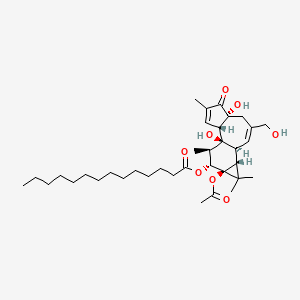
|
phorbol 13-acetate 12-myristate |
Phorbol 13-acetate 12-myristate is a lipid of Prenol Lipids (PR) class. The involved functions are known as DNA Fragmentation, Phosphorylation and Irritation. Phorbol 13-acetate 12-myristate often locates in low-density lipoprotein particle. The associated genes with phorbol 13-acetate 12-myristate are FPR1 gene and ABCB1 gene. |
40921 |
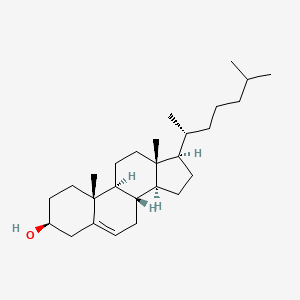
|
cholesterol |
cholesterol is a lipid of Sterol Lipids (ST) class. Cholesterol is associated with abnormalities such as Trypanosomiasis, Chagas Disease, Cleft Palate, Chondrodysplasia punctata 2, X-linked dominant and Child syndrome. The involved functions are known as Blood Circulation, Sterol Biosynthesis Pathway, Receptor Mediated Endocytosis, Methylation and Signal. Cholesterol often locates in Animal tissue, Blood, Membrane, Plasma membrane and peroxisome. The associated genes with cholesterol are MBD2 gene, SIM, SLC33A1 gene, Genome and NSDHL gene. The related lipids are Sterols, zymosterol, fecosterol, Total cholesterol and 7-dehydrocholesterol. The related experimental models are Mouse Model, Knock-out, Genetically Engineered Mouse and Disease model. |
98461 |























